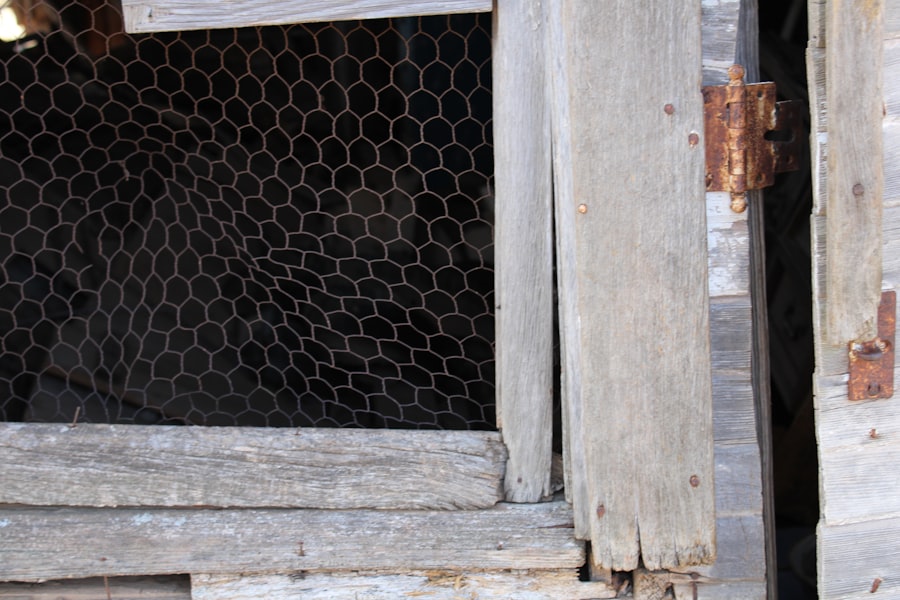Chickens are naturally curious and inquisitive animals with an instinctual drive to scratch and forage for food. This behavior is essential for their well-being but can become problematic when they access areas like raised garden beds. Understanding chicken behavior is crucial for developing effective solutions to keep them out of these spaces.
Chickens are creatures of habit, making it challenging to break established routines of scratching and foraging in specific areas. As highly social animals, they tend to follow the lead of dominant flock members, meaning that if one chicken accesses a raised bed, others are likely to follow. These birds are opportunistic feeders, taking advantage of any available food source, including insects, worms, and vegetation found in raised garden beds.
Their natural feeding behaviors explain their attraction to these areas. Chickens also exhibit territorial instincts and may view raised garden beds as part of their domain, especially if they have been allowed access in the past. Chickens’ social nature, feeding habits, and territorial behavior all contribute to their interest in raised garden beds.
Understanding these traits is essential for implementing effective deterrents and managing their access to these areas.
Table of Contents
- 1 Creating physical barriers
- 2 Implementing deterrents
- 3 Using natural repellents
- 4 Providing alternative areas for scratching and foraging
- 5 Training chickens to stay out of raised beds
- 6 Seeking professional advice
- 7 FAQs
- 7.1 What are the common methods to keep chickens out of raised beds?
- 7.2 How effective is using chicken wire or hardware cloth to keep chickens out of raised beds?
- 7.3 What type of fencing is recommended for keeping chickens out of raised beds?
- 7.4 Are there any plants that can naturally deter chickens from raised beds?
- 7.5 How can chickens be trained to stay away from raised beds?
Key Takeaways
- Chickens are naturally curious and will scratch and forage in raised beds
- Physical barriers such as fences and netting can prevent chickens from accessing raised beds
- Deterrents like motion-activated sprinklers or noise-making devices can discourage chickens from entering certain areas
- Natural repellents like citrus peels or garlic can be used to keep chickens away from raised beds
- Providing alternative areas for scratching and foraging can redirect chickens’ behavior away from raised beds
- Training chickens to stay out of raised beds can be achieved through consistent reinforcement and positive reinforcement
- Seeking professional advice from a veterinarian or animal behaviorist can provide tailored solutions for managing chickens’ behavior
Creating physical barriers
Fencing and Chicken Wire Barriers
One effective way to keep chickens out of raised garden beds is by creating physical barriers that prevent them from accessing these areas. This can be achieved by installing fencing around the perimeter of the garden beds or using chicken wire to cover the top of the beds. The fencing should be tall enough to prevent chickens from flying or jumping over it, and the chicken wire should be securely fastened to the edges of the beds to prevent chickens from squeezing through any gaps.
Additional Deterrents
Additionally, placing heavy objects such as rocks or bricks around the base of the fencing can help to further deter chickens from attempting to access the raised beds.
Netting as a Physical Barrier
Another physical barrier that can be effective in keeping chickens out of raised garden beds is the use of netting. Netting can be draped over the top of the beds and secured with stakes or weights to prevent chickens from landing on the soil. The netting should be strong enough to support the weight of a chicken and should have small enough gaps to prevent them from getting their heads or feet caught. It is important to regularly inspect and maintain the netting to ensure that it remains intact and secure.
Implementing deterrents

In addition to physical barriers, there are several deterrents that can be implemented to discourage chickens from accessing raised garden beds. One effective deterrent is the use of motion-activated sprinklers. These devices are equipped with sensors that detect movement and automatically spray water when triggered.
The sudden burst of water startles the chickens and teaches them to associate the raised garden beds with an unpleasant experience, ultimately discouraging them from returning to these areas. Another effective deterrent is the use of noise-making devices such as wind chimes or bells. These devices can be hung around the perimeter of the garden beds and will create a loud noise when disturbed by the chickens.
The unexpected sound will startle the chickens and make them wary of approaching the raised beds in the future. Additionally, natural predators such as dogs or cats can be used as deterrents to keep chickens away from raised garden beds. Allowing a well-trained dog or cat to patrol the area around the garden beds can create a sense of danger for the chickens, making them less likely to venture into these areas.
Using natural repellents
Natural repellents can also be effective in deterring chickens from accessing raised garden beds. One common natural repellent is the use of strong-smelling herbs and spices such as garlic, onion, or cayenne pepper. These can be sprinkled around the perimeter of the garden beds or mixed with water and sprayed onto the soil.
The strong odors and flavors will discourage chickens from approaching these areas. Another natural repellent is the use of citrus peels. Chickens are known to dislike the smell of citrus, so placing citrus peels around the edges of the raised garden beds can help to keep them away.
Additionally, vinegar can be diluted with water and sprayed onto the soil to create an unpleasant environment for chickens.
Providing alternative areas for scratching and foraging
One way to prevent chickens from accessing raised garden beds is by providing them with alternative areas for scratching and foraging. This can be achieved by creating designated scratching areas within their enclosure or allowing them access to a larger outdoor space where they can engage in natural behaviors. Creating designated scratching areas can be as simple as filling a shallow container with sand or dirt and scattering some treats or mealworms on top.
This will encourage the chickens to scratch and forage in these designated areas rather than seeking out raised garden beds. If space allows, allowing chickens access to a larger outdoor area can also help to satisfy their natural instincts. This can be achieved by using portable fencing or chicken tractors to create temporary enclosures around different areas of the yard, allowing the chickens to rotate between different spaces for scratching and foraging.
Training chickens to stay out of raised beds

Positive Reinforcement Training
Training chickens to stay out of raised garden beds can be a time-consuming but effective solution. This can be achieved through positive reinforcement training, where chickens are rewarded for staying away from these areas. Treats such as mealworms or sunflower seeds can be used as rewards for good behavior, while a firm “no” or gentle redirection can be used to discourage unwanted behavior.
Consistency is Key
Consistency is key when training chickens, so it is important to reinforce the desired behavior every time they approach the raised garden beds. Over time, they will learn to associate staying away from these areas with positive rewards and will be less likely to venture into them.
Long-Term Results
With consistent training and positive reinforcement, chickens will eventually learn to respect the raised garden beds and stay away from them. This will not only protect your garden but also strengthen the bond between you and your chickens.
Seeking professional advice
If all else fails, seeking professional advice from a veterinarian or animal behaviorist may be necessary. These professionals can provide expert guidance on understanding chicken behavior and implementing effective strategies for keeping them out of raised garden beds. A veterinarian can assess the overall health and well-being of the chickens and provide recommendations for managing their behavior.
An animal behaviorist can offer specialized training techniques tailored to the specific needs of the flock, taking into account their individual personalities and social dynamics. In some cases, professional advice may also involve assessing the overall living conditions and enrichment opportunities for the chickens to ensure that their physical and behavioral needs are being met. By seeking professional advice, chicken owners can gain valuable insights and support in addressing issues related to chicken behavior and finding effective solutions for keeping them out of raised garden beds.
If you’re looking for more tips on keeping chickens, check out this article on 10 essential tips for building a chicken coop. It’s important to provide your chickens with a safe and comfortable living space, and this article offers valuable advice on how to do just that.
FAQs
What are the common methods to keep chickens out of raised beds?
Some common methods to keep chickens out of raised beds include using physical barriers such as chicken wire or hardware cloth, installing fencing around the raised beds, using natural deterrents like plants with strong scents, and training the chickens to stay away from the raised beds.
How effective is using chicken wire or hardware cloth to keep chickens out of raised beds?
Using chicken wire or hardware cloth can be an effective method to keep chickens out of raised beds. These materials create a physical barrier that prevents chickens from accessing the raised beds and damaging the plants.
What type of fencing is recommended for keeping chickens out of raised beds?
For keeping chickens out of raised beds, it is recommended to use a sturdy and tall fencing material such as welded wire or electric netting. This type of fencing can effectively deter chickens from entering the raised beds.
Are there any plants that can naturally deter chickens from raised beds?
Yes, there are certain plants with strong scents that can naturally deter chickens from raised beds. Some examples include marigolds, lavender, and rosemary. Planting these around the perimeter of the raised beds can help keep chickens away.
How can chickens be trained to stay away from raised beds?
Chickens can be trained to stay away from raised beds by using positive reinforcement and negative reinforcement. Positive reinforcement involves rewarding the chickens for staying away from the raised beds, while negative reinforcement involves using deterrents such as loud noises or water sprays when the chickens approach the raised beds.
Meet Walter, the feathered-friend fanatic of Florida! Nestled in the sunshine state, Walter struts through life with his feathered companions, clucking his way to happiness. With a coop that’s fancier than a five-star hotel, he’s the Don Juan of the chicken world. When he’s not teaching his hens to do the cha-cha, you’ll find him in a heated debate with his prized rooster, Sir Clucks-a-Lot. Walter’s poultry passion is no yolk; he’s the sunny-side-up guy you never knew you needed in your flock of friends!







